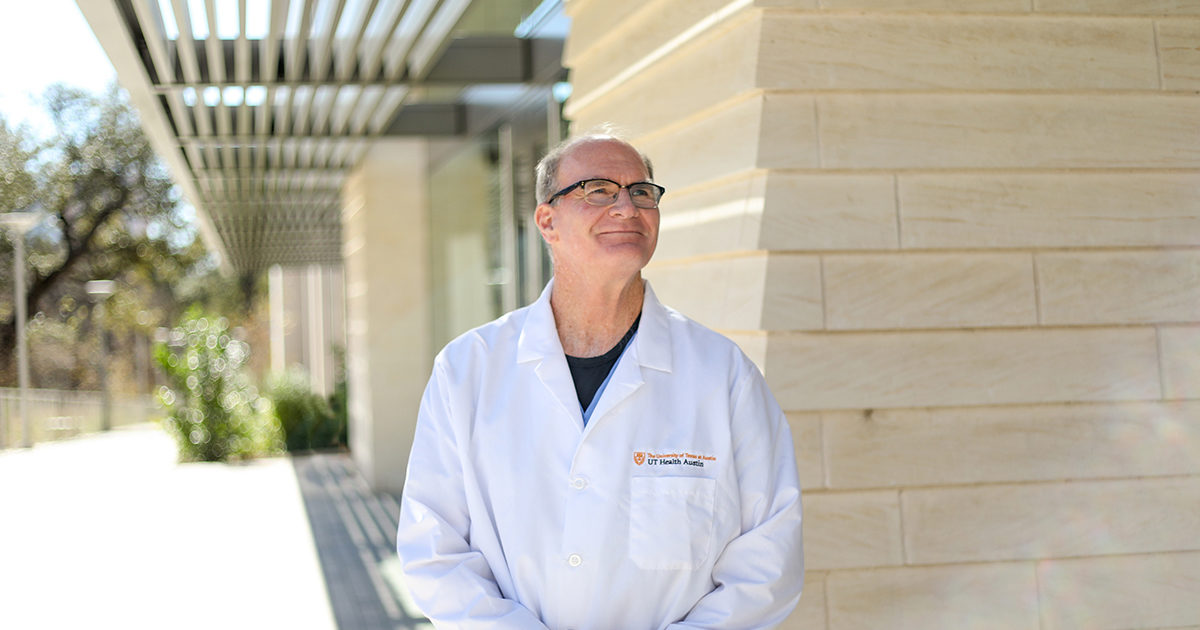Meet Your Personal Care Team
UT Health Austin offers a team-based approach to personalized care

At UT Health Austin, your care team will be made up of many different kinds of medical professionals (from nurses to, emotional health experts to dietitians and physical therapists) who focus everything they do on your unique needs. Beginning with multi-specialty pre-visit discussions where your whole team discusses how to deliver the best care possible, your UT Health Austin experience will feature clearly explained treatment options designed especially for you. And, as Michael Breen, MD, a nationally recognized laparoscopic and robotic surgery expert who specializes in treating endometriosis and pelvic pain in Women’s Health a clinical partnership between Ascension Seton and UT Health Austin, explains, given the incredible amount of information available in today’s complex medical practice environment, our team approach to personalized patient care just makes sense.
Another UT Health Austin difference is how our coordinated care team approach actually saves patients time and the need to travel to multiple appointments at multiple locations. But even with focused expertise, a whole-person care plan, and the convenience of having your entire care team guiding you through every part of your treatment, when you ask Dr. Breen what he believes to be the most important feature of the UT Health Austin care experience, his answer involves communication.
Another UT Health Austin difference is how our coordinated care team approach actually saves patients time and the need to travel to multiple appointments at multiple locations. But even with focused expertise, a whole-person care plan, and the convenience of having your entire care team guiding you through every part of your treatment, when you ask Dr. Breen what he believes to be the most important feature of the UT Health Austin care experience, his answer involves communication.
“One of the things about UT Health Austin that makes such a difference in our patients’ lives,” he says, “is having a focused care team working closely together. In the UT Health Austin Women’s Health Institute, for example, your clinicians will already be informed about many of the details of your personal situation before they even walk into your care room because we will have reviewed all the material we could gather about you before you arrived. If we know you are experiencing pelvic pain, we will have talked to multiple medical professionals, such as a gastroenterology specialist, a gynecologic pain specialist, or a gynecologic surgeon. We include a psychologist and a pelvic floor physiotherapist on the team to give you the best whole-person treatment options we can. So even if you only need to see one particular care team member during a specific visit, you are actually seeing your entire care team every step of the way.”
Another UT Health Austin difference is how our coordinated care team approach actually saves patients time and the need to travel to multiple appointments at multiple locations. But even with focused expertise, a whole-person care plan, and the convenience of having your entire care team guiding through every part of your treatment, when you ask Dr. Breen what he believes to be the most important feature of the UT Health Austin care experience, his answer involves communication.
“To me, the most important thing we are trying to do at the UT Health Austin Women’s Health Institute is to change the conversation about the health issues that affect women,” he says. “Because, for many years, women simply did not talk about the conditions we chose to be the first we would treat (chronic pelvic pain, pelvic floor disorders, and vulvar disorders). They are much more common than many women realize. And there are treatments that can significantly improve the quality and comfort of a woman’s life. But we have to change the conversation. If we go back 15 or 20 years, no one ever talked about breast cancer. No one ever seemed to have a family member who had breast cancer. But now, those conversations are common, and as a result, more women understand their risks, their options, and the things they can do to identify potential issues as early on as possible.
“We hope that our work here, at the UT Health Austin Women’s Health Institute will help put that same kind of change in motion for chronic pelvic pain. Removing some of the sensitivity around these admittedly very personal issues could make a big difference in how women feel about themselves, and it could give their friends and family the opportunity to offer the understanding and support that can mean so much. And most of all, it will encourage women to seek the care they need since no one should experience pain when there are options that data has shown can offer real hope and real help.”
For more information about Women’s Health or to request an appointment, visit here.